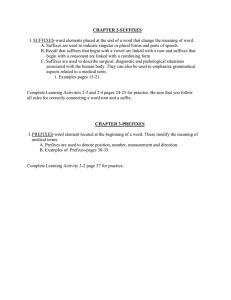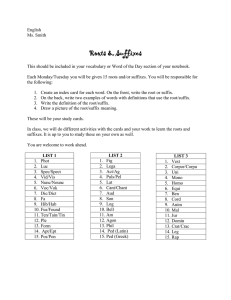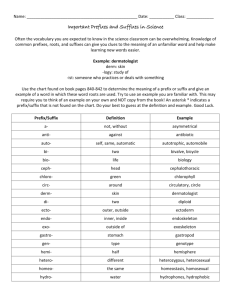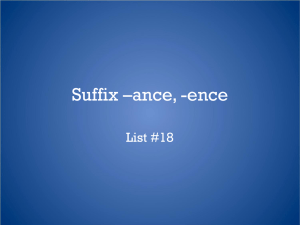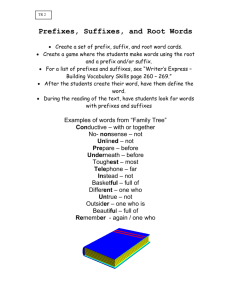Suffixes: -logy, -ic, -ive Vocabulary Instruction Tool
advertisement
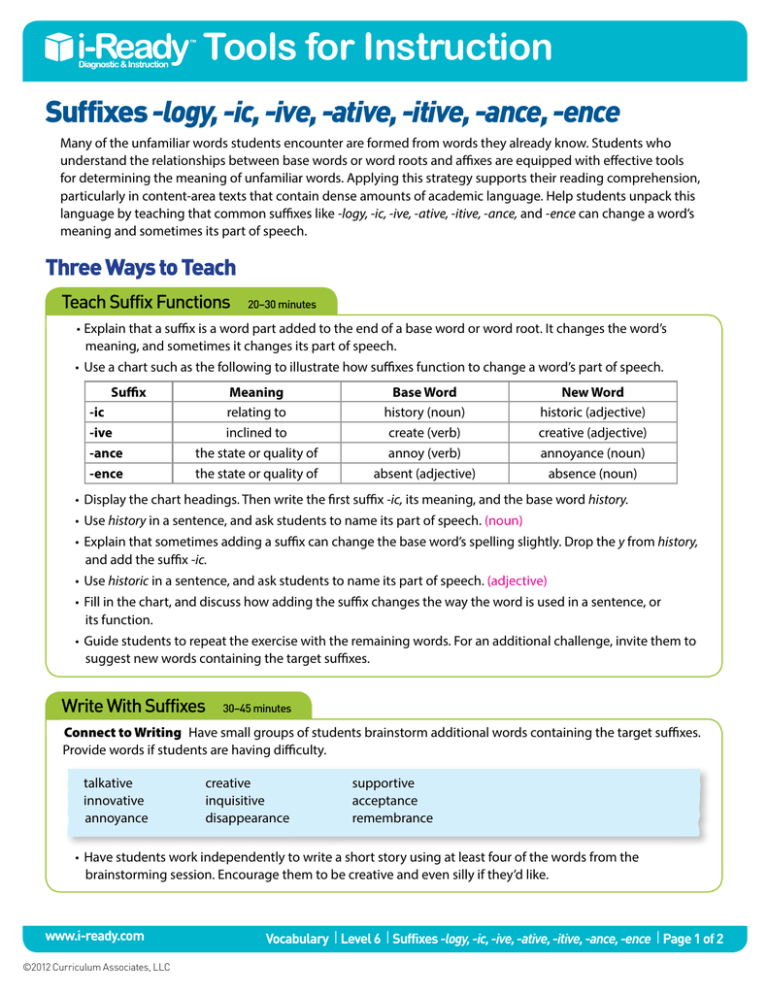
Tools for Instruction Suffixes -logy, -ic, -ive, -ative, -itive, -ance, -ence Many of the unfamiliar words students encounter are formed from words they already know. Students who understand the relationships between base words or word roots and affixes are equipped with effective tools for determining the meaning of unfamiliar words. Applying this strategy supports their reading comprehension, particularly in content-area texts that contain dense amounts of academic language. Help students unpack this language by teaching that common suffixes like -logy, -ic, -ive, -ative, -itive, -ance, and -ence can change a word’s meaning and sometimes its part of speech. Three Ways to Teach Teach Suffix Functions 20–30 minutes •Explain that a suffix is a word part added to the end of a base word or word root. It changes the word’s meaning, and sometimes it changes its part of speech. • Use a chart such as the following to illustrate how suffixes function to change a word’s part of speech. Suffix -ic -ive -ance -ence Meaning relating to inclined to the state or quality of the state or quality of Base Word history (noun) create (verb) annoy (verb) absent (adjective) New Word historic (adjective) creative (adjective) annoyance (noun) absence (noun) • Display the chart headings. Then write the first suffix -ic, its meaning, and the base word history. • Use history in a sentence, and ask students to name its part of speech. (noun) • Explain that sometimes adding a suffix can change the base word’s spelling slightly. Drop the y from history, and add the suffix -ic. • Use historic in a sentence, and ask students to name its part of speech. (adjective) • Fill in the chart, and discuss how adding the suffix changes the way the word is used in a sentence, or its function. • Guide students to repeat the exercise with the remaining words. For an additional challenge, invite them to suggest new words containing the target suffixes. Write With Suffixes 30–45 minutes Connect to Writing Have small groups of students brainstorm additional words containing the target suffixes. Provide words if students are having difficulty. talkative innovative annoyance creative inquisitive disappearance supportive acceptance remembrance • Have students work independently to write a short story using at least four of the words from the brainstorming session. Encourage them to be creative and even silly if they’d like. www.i-ready.com ©2012 Curriculum Associates, LLC Vocabulary I Level 6 I Suffixes -logy, -ic, -ive, -ative, -itive, -ance, -ence I Page 1 of 2 i-Ready Tools for Instruction Write With Suffixes continued Her disappearance is certainly an annoyance. We are going to have to be creative to find her. Do you think the neighbors will mind if we are inquisitive about a missing dog? • Invite volunteers to share their completed stories with the class. Ask classmates to point out words containing the target suffixes. Experiment With Suffixes 10–15 minutes Playing games to form words with suffixes increases word consciousness and promotes vocabulary growth— even when some of the words formed are not real words. • Provide sample base words that students will recognize, such as talk, support, zoo, and resist. • Display the target suffixes and their meanings. Suffix Meaning -logy the study of -ic relating to -ive/-ative/-itive inclined to -ance/-ence state or quality of • Have student pairs experiment with making words by applying each base word to each suffix. Clarify that some of the words they make will not be real words, but this exercise is meant to help reinforce word building and the ways that suffixes can affect a word’s meaning. • Encourage students to manipulate the end letters of the root word as needed, and point out that -logy most often appears in words with an o before it, as in biology. • Call on pairs to give brief oral sentences explaining the words’ meanings. For example: Supportology is the study of supporting people. • Keep a running list of real words and nonwords as students share, to avoid confusion. Check for Understanding If you observe... Then try... difficulty seeing how words with the same suffix are similar providing sentence frames using sample words with the same suffix, such as these: • Someone who is creative likes to create. • Someone who is talkative likes to talk. difficulty combining base words and suffixes simplifying the task by choosing a single base word and suffix, and offering a structured example students can follow: • Create plus -ive becomes creative. What does decorate plus -ive become? Remind students that the last letter of the base word often gets dropped when the suffix is added. www.i-ready.com ©2012 Curriculum Associates, LLC Vocabulary I Level 6 I Suffixes -logy, -ic, -ive, -ative, -itive, -ance, -ence I Page 2 of 2
